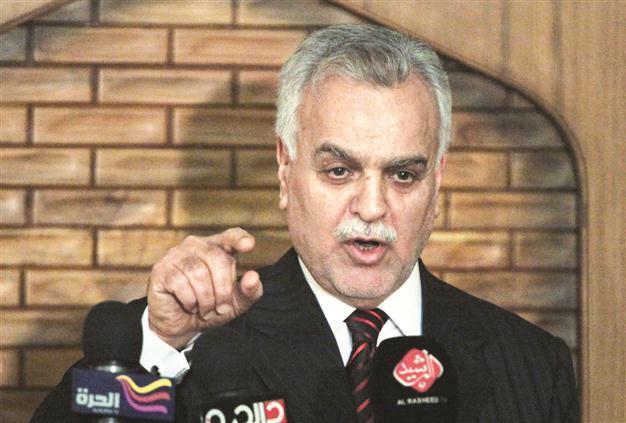Iraqi political crisis grows with travel ban
BAGHDAD

Iraq’s Vice President Tareq al-Hashemi. AP photo
Iraq’s Vice President Tareq al-Hashemi has been barred from travelling overseas, officials said yesterday, the latest development in a political crisis shortly after U.S. troops completed a pullout.
Hashemi and Deputy Prime Minister Saleh al-Mutlak, both Sunnis and members of the secular Iraqiya bloc, have come under increasing pressure, with three of the vice president’s bodyguards arrested in connection with “terrorist activity.” “A five-member judicial committee has decided to prevent Tareq al-Hashemi and a number of his guards from travelling overseas due to issues related to terrorism,” a senior security official told Agence France-Presse. Baghdad security spokesman Major General Qassim Atta said three of Hashemi’s bodyguards were arrested for “suspected terrorist activity” Dec. 17 evening, when the vice president was briefly escorted off a domestic flight from Baghdad to the city of Sulaimaniya to meet the Iraqi president. In a statement yesterday, Hashemi accused Maliki’s government of “deliberate harassment” after his plane was delayed for three hours at Baghdad airport.
The latest events come after the Iraqiya bloc of Hashemi and Mutlak said Dec. 17 it was boycotting parliament in protest over the prime minister’s alleged monopolizing of power. The following day, Maliki called for Mutlak to be ousted. Lawmakers are due to consider the request on Jan. 3, a parliament official said. Iraqiya, which holds 82 seats in the 325-member parliament and controls nine ministerial posts, has not pulled out of Iraq’s national unity government.
The bloc, which garnered most of its support from the Sunni Arab minority, was out-maneuvered for the premiership by Maliki.
